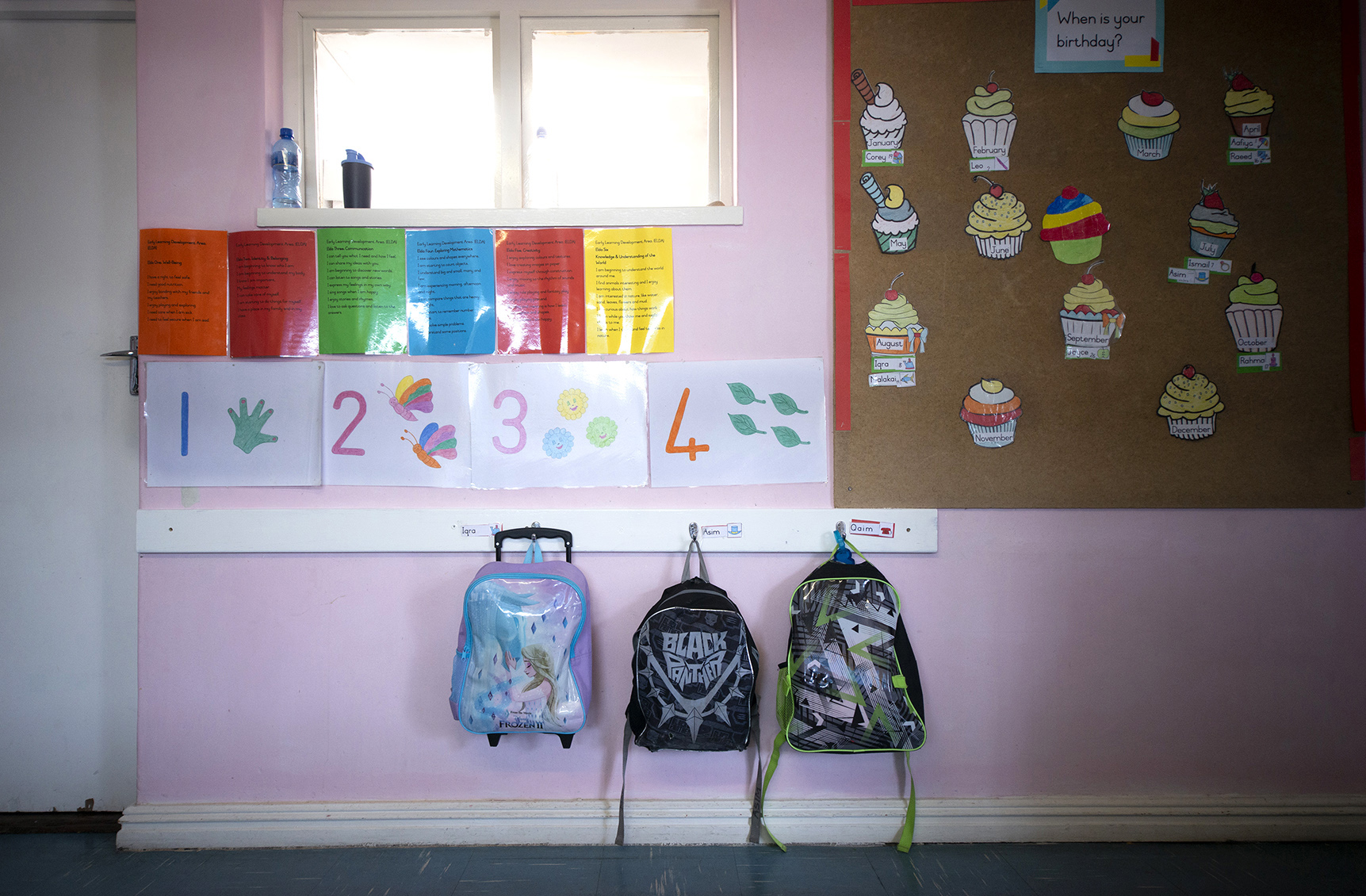Once we start looking at Early Learning Centres as social enterprises, we can unlock a triple-layered impact for our country and its youngest generation: small business development (for school owners); employment opportunities (predominantly for women in jobs like teachers, assistant teachers, carers, cooks and cleaners); and improved education (for all children).
In South Africa, 1.6 million children (72%) under six years old are enrolled to attend an Early Learning Programme meant to prepare them for school. It is a concern that this figure was closer to 2 million before the pandemic.
We know that quality early childhood education provides persistent, life-long benefits to the child and society even after the child has left preschool. That is why these early years are so crucial – they set up a child with higher odds for success at school and later in life. What is good for the country’s children is also good for the country’s economy and society.
The government has an ambitious vision: all children in South Africa should have access to opportunities for learning through standardised quality Early Learning Programmes (ELPs), good health, adequate nutrition, safety and security and responsive caregiving.
The plan is to provide universal access to quality early learning and care in spaces that are safe and compliant. ELPs should also implement the National Curriculum Framework, be appropriately resourced to deliver play-based education, and have trained staff.
Yet, a recent media statement reveals that 1.3 million children aged between three and five are not attending any form of early learning. A total of 66% of the poorest children (Q1) are not in Early Learning Programmes compared with 36% of the wealthiest. And, worst, only 45% of children accessing early learning are developmentally on track.
The gap between where we are and where we want to be is massive.
Government can play a significant role but cannot bridge this gap on its own. ECD centres are still primarily private, small businesses, often registered as NPOs to access potential subsidy funding. (This has recently changed. The DBE announced in early 2023 that ECD centres no longer need to be registered as NPOs to apply for the subsidy.)
In many cases, these small businesses are relatively informal and run by owner-operators who have a heart for children but lack a head for business. Unlike primary or high schools, the Department of Education will never have the budget to operate, maintain and pay the salaries of the 200,000 people currently employed in this sector, not to mention the additional centres and staff required to live up to the mandated “access for all”.
We need to leverage the numerous passionate and prominent ECD organisations already operating across the country to ensure impact at scale.
Every child deserves five-star quality early education, and they need affordable access to this level of quality if we want to break the cycle of inequality.
“Okay” education is not good enough.
Our country’s obsession with matric results means we neglect early learning results. We must prioritise early childhood development as a crucial component of the education system.
The latest ECD Census (2021) reveals that South Africa has 42,420 ELPs – 60% are urban and 40% are rural. These centres care for 1,6 million children and employ 198,361 staff members.
Forty percent of these ELPs are fully or conditionally registered, 16% are in the process of registering and 42% of programmes are not registered. Thirty-three percent receive a subsidy (only registered centres may apply for the subsidy).
Only 52% of teaching staff have a relevant ECD qualification, an alarming 22% have no teaching qualification at all, and 26% have attended a skills training programme.
The average ECD Centre would have 39 learners and charge R509 per month. Thirty-four percent do not have an outdoor play area with suitable equipment and 44% do not have access to age-appropriate books. Fifty percent do not have materials for counting and 63% do not have instruments for rhythm. It is not surprising that so few children (only 45%) are “on track”.
On 1 April 2022, the Early Childhood Development competence moved from the Department of Social Development to the Department of Basic Education.
The controversial Basic Education Laws Amendment Bill aims to make a host of changes to schools in South Africa, many of which are controversial. The one proposal which is being met with broad support is the proposed change to make Grade R the mandatory new school starting age, as opposed to Grade 1. While this sounds good on paper, we must realise that inclusion doesn’t guarantee quality.
To make quality early learning accessible and affordable for all South African children, we need numerous interventions.
Some may take generations to implement. However, some interventions are implementable within the next 24 months and have the potential to support a fundamental paradigm shift.
 The Department of Basic Education announced in early 2023 that ECD centres no longer need to be registered as NPOs to apply for a subsidy. (Photo: David Harrison)
The Department of Basic Education announced in early 2023 that ECD centres no longer need to be registered as NPOs to apply for a subsidy. (Photo: David Harrison)
1. ECD teachers need a practical playbook
To support ECD teachers effectively, we must provide them with practical tools that demonstrate what high-quality, play-based education looks like, rather than simply instructing them. It is crucial to bridge the gap between theory and practice by bringing educational concepts to life in the classroom, particularly for new teachers.
While the National Curriculum Framework serves as an exceptional and well-thought-out theoretical model for guiding curriculum development in all preschools, we cannot assume that every teacher possesses the skills or capacity to interpret and implement it effectively. Teachers tend to teach the way they were taught.
By providing them with a practical playbook that showcases exemplary educational practices, we empower them to deliver exceptional learning experiences.
2. ECD centre owners need to apply a business mindset
ECD centres must be seen as social enterprises delivering essential community service, not community care services. Many ECD centre owners are stuck in a “beneficiary” mindset rather than a “business owner” mindset.
When ECD centre owners start applying business principles such as fair labour practice, financial recordkeeping, professional administration, customer service, breakeven-based price setting, and marketing, their centres become more sustainable and they finally have the potential to improve the quality of education in their classrooms.
We should take a “Profit for Purpose” perspective and understand that quality service delivery requires money, cash flow and reinvestment. This doesn’t take away the need for effective funding mechanisms for centres serving children from poor households, but we do need to change how we fund. Funding needs to be outcomes-based on quality metrics.
3. Raise the bar by having best practice examples in every neighbourhood.
While legal barriers to entry exist, their efficacy is undermined by insufficient enforcement and a lack of consequences. Consequently, individuals lacking the minimum qualifications and disregarding essential criteria enter the ECD business realm, ultimately eroding the overall standards and expectations of the sector.
My proposal is that anyone who opens an ECD centre should have an ECD qualification and attend an incubator programme on exactly what is required to start an ECD social enterprise. This puts a barrier to entry in place that ensures that only individuals who are trained (in education, legal requirements and business) can open.
Imagine a scenario where each neighbourhood boasts an exemplary ECD centre, serving as a beacon of inspiration for others to emulate. By nurturing a culture of excellence and encouraging the replication of best practices, we can uplift the entire sector.
4. Fair pay for teachers
ECD teachers work long hours, are expected to have invested in further education, do meaningful work and have a massive responsibility taking care of children every day, yet 90% do not earn minimum wage.
A recent study showed that “the vulnerability of childcare workers — assessed by their status of employment and their place of work — is directly related to the level of public financing for childcare services”.
In SA, ECD is funded by a R17 per child per day subsidy, which only 20% of children receive. The value calculated over the year is R4,488 per child annually, with only 40% being allocated for salaries.
This is partly because centres are not operated to be financially sustainable and partly because, as a country, we pay no heed to unfair labour practices.
We cannot expect to see the quality of education increase if we are not willing to compensate those people doing the job with at least a living wage.
Our data revealed that, on average, principals earn 88% and teachers 63% of the minimum wage. In some provinces, the averages dip as low as 50% of the minimum wage, often compounded during December and January when many parents keep their children at home and refuse to pay school fees. This situation is not a reflection of centre owners’ willingness but rather their ability to operate their preschools like a business, their ability and skill to charge breakeven fees, and parents’ commitment to pay for schooling.
5. Technology can help democratise access
Technology can be a great equaliser, but there must be two crucial elements: access and quality.
Regarding access: Technology should be freely available, accessible on devices that people already possess, and eradicate obstacles such as data costs (zero-rating).
And on quality: We must view children, parents and teachers as active consumers rather than passive recipients. While ECD teachers currently have access to numerous resources, many fall short in terms of appropriateness and quality.
Integrating technology into ECD can be done by implementing key interventions such as zero-rating digital curriculum content and providing access to high-quality, curated resources. Technology has the capacity to revolutionise access, democratise opportunities, and empower centres with the tools needed for professionalisation, streamlined operations, improved financial management, and most importantly, the ability to uncover sector-wide trends based on accurate data.
Technology helps us scale impact beyond organisational boundaries. To achieve this, organisations working to support this sector must collaborate and share best practices and resources. It challenges us to let go of ego and agenda and share our resources and insights as gifts to the sector.
Finally, data-driven decision-making is made possible – the more people using the tech, the more data-driven insights are available to the sector stakeholders.
The ECD sector has the opportunity to create thousands of new jobs if quality ECD is accessible to all.
If we empower social entrepreneurs to grow their businesses, we will see a triple impact – small business development, job creation (especially for women) and improved education outcomes. DM
Tracey Chambers is the CEO and Co-Founder of the non-profit organisation Grow ECD.




 The process of registering an early childhood development centre involves many costs, including building plans, development fees and scrutiny fees. (Photo: David Harrison)
The process of registering an early childhood development centre involves many costs, including building plans, development fees and scrutiny fees. (Photo: David Harrison)